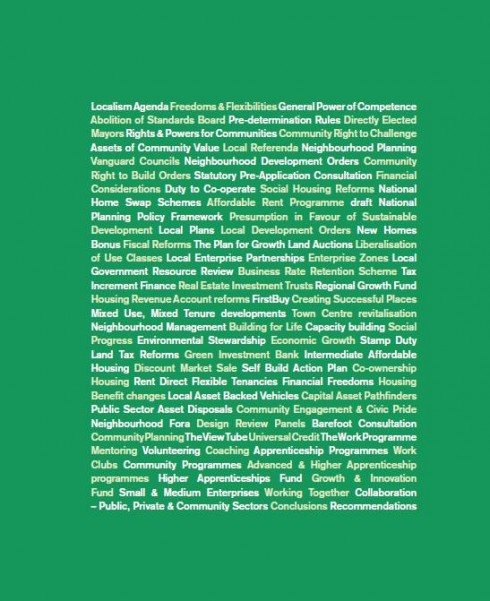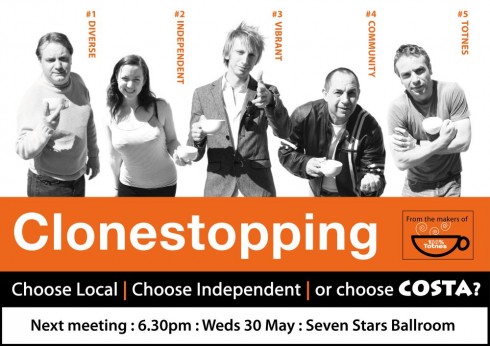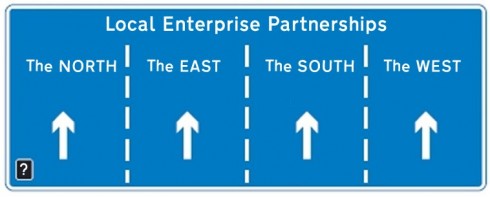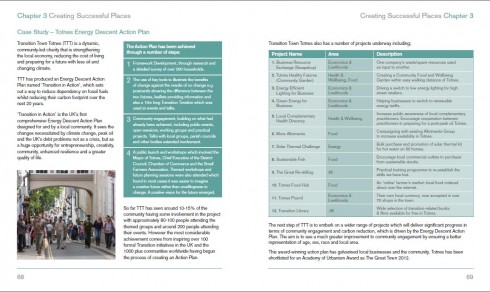28 May 2012
Why we need to put the Local back into Local Enterprise Partnerships
There are, as Andrew Simms points out in his most recent blog, two narratives about our economic choices moving forward from here, growth or austerity. Some argue we need austerity in order to get growth, others that we can just cut straight to the growth by printing or borrowing more money. The government recently announced a “massive push for growth“, with £950m being recently allocated for the ‘Regional Growth Fund’ (out of what is expected to be £1.4bn in total), in spite of the fact that money spent so far through the RGF was recently criticised for spending as much as £200,000 to create a single job. One of the key channels for distributing and allocating RGF funds is the Local Enterprise Partnerships (LEPs). According to my big-green-book-of-localism the government kindly sent me last year, LEPs are “locally-owned partnerships between local authorities and businesses which will play a central role in determining economic priorities, undertaking activities to drive economic growth and the creation of local jobs”. Yet on closer inspection, LEPs would appear to embody everything that is bereft of vision, imagination and indeed of any of the kind of creativity and thinking that these times demand.
So, let’s start by framing some of the challenges that communities up and down the country are facing. Energy prices are becoming increasingly volatile, with the International Energy Agency warning again recently that oil prices remain a threat to fragile global economic recovery. It looks increasingly likely that Greece will leave the Euro, which will have major economic impacts on the rest of Europe’s economies, including the UK, one of the most indebted nations in the world. The Bundesbank caused market plunges yesterday after stating that Greece leaving the Euro would be “manageable”. The scale of the debt mountain we sit on top of is vast, and its implications are only just starting to be realised. At the same time, growth that is generated through an increase in consumption (is there any other kind?) is already running up against natural limits. Global carbon emissions hit a new record in 2011, a trajectory that could lead to 11°F of warming, scientists arguing that this could lead to abrupt ‘flips’ in how the climate functions. As Simms notes, “the most recent ecological footprint data tells us that in spite of the rickety state of the economy and lack of demand, globally our rate of consumption is 52 percent more than nature can take”.
Any economic approach that is to be appropriate for the next 5-10 years needs to have the following qualities:
- Resilient: a focus on building community resilience, increasing its ability to meet its own needs and ability to weather shocks
- Oil independent: break the link between local economies’ ability to be successful and their dependence on cheap fossil fuels to make that possible
- Low carbon: substantially reduce the carbon-intensity of the way in which local economies function
- Skills and training: it must maximise opportunities for young people to learn appropriate skills and set up their own enterprises in such a way that it generates the least amount of indebtedness possible
- Inward investment: where possible, ‘plugging the leaks’ of local economies should be a priority, in particular models that allow communities to invest in and benefit from key developments in the area
- Democratic: the destiny of local economies should be in the hands of local people. If they want supermarkets or other corporate behemoths in their local economy that’s fine, but if they don’t they should have the ability to defend themselves
- Distance matters: what Jason McLennan calls a “near-heavy, far-light” economy, which he explains like this: “in the near future anything heavy will become intensely local while at the same time the limits to things that are ‘light’, ideas, philosophies, information will travel even further than today—literally and figuratively”. This is, in effect, economic globalisation going into reverse.
This is a third story to sit alongside austerity and growth in the debates that are raging both nationally and internationally about where we go from here. It is about seeing community resilience as economic development. It is the story that says much of what we need is already around us, we need to look at the opportunities in a different way. It’s not so much about economic growth as about a web of local and interconnected economies that find the appropriate size at which they maximise well-being and happiness and are happy to stay at that level, rather than continuously growing for the sake of it. It’s about the tremendous opportunities for innovation that local food, local energy, local economics and local construction materials present us with.
So, with that as a starter check-list, let’s bring the focus back to our LEPs. They are non-statutory bodies comprising business and civic leaders whose mission is to drive “sustainable local economic growth”. They are also, as I stated above, one of the key channels by which massive amounts of government money will be funnelled to the regions of the UK in order to make economic growth happen. Yesterday I sat down and read The Heart of the South West (HotSW), my local LEP’s business plan document and it raises a number of deep concerns I want to explore here. While on the surface the LEP looks like it will promote and boost local economies, it appears designed from the outset to do exactly the opposite. This should be a cause for considerable alarm.
According to my localism book (which, interestingly, contains Transition Town Totnes’ Energy Descent Action Plan as a state-of-the-art case study, see above) some of the responsibilities that an LEP can take on (intriguingly, central government doesn’t determine an LEP’s priorities) include:
- Working with government to set out key investment priorities;
- Coordinating proposals or bidding directly for the Regional Growth Fund;
- Supporting high growth businesses (emphasis added);
- Making representation on the development of national planning policy and ensuring business is involved in the development and consideration of strategic planning applications;
- Leading changes in how businesses are regulated locally;
- Strategic housing delivery;
- Working with local employers, Jobcentre Plus and learning providers to help local jobless people into employment;
- Coordinating approaches to leveraging funding from the private sector;
- Exploring opportunities for developing financial and non-financial incentive on renewable energy projects and Green Deal; and
- Becoming involved in delivery of other national priorities such as digital infrastructure.
“to create more sustainable jobs (the term ‘sustainable’ is in fact in bold in the original too) by supporting and promoting our enterprises and capitalising upon the unique opportunities existing in the Heart of the South West”.
The term is referred to several times, but what does it mean? Is any job sustainable in terms of being able to continue indefinitely, a job for life, or even better, a job that can be handed down to future generations? No. Are we meaning sustainable jobs as in jobs that leave the world in a better state ecologically than it was found in? As we shall see, that is certainly not what is meant here, although it would be great if it was. Is it, rather, based on Greg Clark MP’s definition that:
“Sustainable development is therefore about positive growth, making economic, environmental and social progress for this and future generations”.
 In this case, a ‘sustainable job’ is a job that ‘sustains’ economic growth. Not the kind of definition I would recognise, but, although the term is never actually defined in this document, piecing it together, that’s what I imagine they are meaning. It is a deeply misleading turn of phrase. I might suggest here that actually a ‘sustainable job’ ought to be one that is actively contributing to the creation of a low carbon economy, that, where possible, is about boosting a local economy’s ability to meet its own needs and cycle more money locally, that is in local ownership and management, and which actively contributes to the creation of a more resilient and sustainable society. That is absolutely NOT the LEP’s definition.
In this case, a ‘sustainable job’ is a job that ‘sustains’ economic growth. Not the kind of definition I would recognise, but, although the term is never actually defined in this document, piecing it together, that’s what I imagine they are meaning. It is a deeply misleading turn of phrase. I might suggest here that actually a ‘sustainable job’ ought to be one that is actively contributing to the creation of a low carbon economy, that, where possible, is about boosting a local economy’s ability to meet its own needs and cycle more money locally, that is in local ownership and management, and which actively contributes to the creation of a more resilient and sustainable society. That is absolutely NOT the LEP’s definition.
Another concern that sets alarm bells ringing is the lack of accountability of the LEPs. They state that part of their role is to “identify the important challenges and opportunities facing our economy, set out priorities for economic growth and prosperity and promote these priorities to businesses, policy makers and investors”. This could, however, be rewritten as “decide what we think, unaccountably among ourselves, with no obligation to consult anyone, the priorities should be set for this region in order to produce prosperity (another term that is never actually defined)”.
Who are these people? On closer inspection, our local LEP is made up of representatives from the education, local authorities and the region’s largest employers. It likes to refer to itself as a “broad partnership”, yet it contains no-one representing communities, no-one who questions growth as an objective, no-one who represents small businesses. There is nothing about LEPs that challenges existing power structures and status quos, indeed they would very much appear to reinforce and strengthen them. Surely if localism is to have any merit at all, it should be about empowering communities, and about balancing out existing power structures and the dominant powers-that-be?
In the world of the LEP, the following beliefs appear to be cast in stone:
- Investment comes from outside in, not from the inside out
- What is needed is not support for fragile local economies and local markets, but rather to “promote infrastructure to connect with markets”, what they call “critical infrastructure”, meaning new roads, ferry terminals, airports and so on
- They are committed to creating a “strategic and balanced economic growth plan”, but surely that should be the work of local authorities where we can at least vote for our representatives?
- That increasing dependence on exports is a good thing. It states that commits to “ensuring all businesses that want to export should be able to do so”
- Building new housing is only a good thing. They state that they will “work with planners and developers to encourage a joined up approach to future housing development to secure our economic prosperity”. But who says housing development secures our economic prosperity? The current approach to housing could be argue as having, since 2008, done exactly the opposite, increasing indebtedness and hugely reduced our economic stability, producing one generation (those over 40) who largely have some form of equity in housing, and those under 40 who unless they inherit money or can command very high salaries, have no hope of ever getting a foothold in the world of property
- That “one of the key barriers to business growth is the relative distance to major economic centres and markets”. Really?
The HotSW document drips with meaningless phrases such as “we want to inspire people to set up their own enterprises and social enterprises in response to opportunities or needs in their communities”, and my favourite, “we want the HotSW area to be one where no good business idea fails due to lack of support of finance”. At the same time, as I wrote a while ago, one of the key pieces of new infrastructure the LEP is actively supporting in order to “promote employment, create wealth and stimulate growth” is a new regional distribution centre for Sainsburys (alongside a new bypass and the expansion of nuclear power at Hinkley).
 Which brings us to the wonderful graphic (designed by Hele Oakley) that opened this piece. In Totnes, one of the larger empty shops in town is subject of a planning application from Costa Coffee. The application is 300 pages long, complete with thinly veiled threats, in the form of the many new cafes they have won on appeal, that trying to turn them down is futile. As one of the responses to this, Transition Town Totnes recently brought together most of the independent coffee businesses for a 3 week Independent Coffee Festival, a celebration of the local cafe culture, which culminated in last weekend’s barista competition. A Costa Coffee in Totnes would erode the diversity of independent traders, would start to significantly erode the unique character of a place which has managed to resist the worst ravages of the ‘Clone Town Britain’ phenomenon that has so affected so many other towns and cities across the country.
Which brings us to the wonderful graphic (designed by Hele Oakley) that opened this piece. In Totnes, one of the larger empty shops in town is subject of a planning application from Costa Coffee. The application is 300 pages long, complete with thinly veiled threats, in the form of the many new cafes they have won on appeal, that trying to turn them down is futile. As one of the responses to this, Transition Town Totnes recently brought together most of the independent coffee businesses for a 3 week Independent Coffee Festival, a celebration of the local cafe culture, which culminated in last weekend’s barista competition. A Costa Coffee in Totnes would erode the diversity of independent traders, would start to significantly erode the unique character of a place which has managed to resist the worst ravages of the ‘Clone Town Britain’ phenomenon that has so affected so many other towns and cities across the country.
Yet the LEP will do nothing to support a community like Totnes in trying to sustain its economic and cultural resilience. There is no notion in the LEP’s thinking of a distinction between job creation and job displacement, nor any sense that a business that actively ‘plugs the leaks’ in its local economy is in any sense preferable to a chain that haemorrhages money to distant shareholders. In the pursuit of economic growth at all costs, local economies, their complex webs of relationships, small and medium sized enterprises, are seen as fair game, as expendable, with the LEP only interested in supporting “local businesses with growth potential”. In other words, if you are happy staying at your current size, you are of no interest, of no use in the relentless push for growth.
In the context of our original checklist, the strategies set out in the HotSW business plan will actually increase the region’s oil dependency at a time when that will be a key vulnerability, will increase the carbon intensity of the economy at a time when national government is committed to an 80% cut by 2050, will increase the distance over which business takes place rather than contract it, will erode democratic accountability in terms of how decisions about the region’s future are made, will actively undermine local resilience, will funnel the money that should be going to build resilient local economies through an old boys’ network to a self-selecting club of large businesses, and will do nothing to support, encourage and enable models whereby communities invest into their own futures.
I find myself deeply frustrated by the reality of what LEPs have become. They are one of the main channels for the funding that communities need in order to build resilience at the local level, to start Transition enterprises, and make use of the tools that localism offers. I have written before about the distinction between localism and localisation, but LEPs disregard both in the pursuit of large-scale projects, leaving current power structures unchallenged and wasting huge amounts of money on projects which actively undermine local economic resilience. So I close with a couple of final questions. Is there some way that we can find constructive ways to work with LEPs? Might we be able to influence government to change how LEPs work? Or should we just turn our backs on them altogether and model different ways of funding and supporting Transition projects? Given that they are the channel set up by government, and, on paper at least, their commitment to broad engagement is stated, perhaps there is still hope?
However, at one point in their business plan, the HotSW LEP pledge that “the LEP board and partners will engage with key stakeholders and be inclusive and open in all communications”. Transition Town Totnes wrote to the Chair of the LEP expressing its willingness to offer support and to share its experiences with the Partnership. We never received a reply.




Alan
28 May 8:41am
I suspect that all of these sub-policies like LEP’s ripple down from a top level strategy that’s fundamentally flawed. As you say, growth or austerity are the only 2 phrases discussed in parliament/media these days. As such I find no surprise that any lower-level action plans from Gov will be flawed as they don’t get the big picture, or the 3rd way…
Equally, north of the border, which I think does have slightly smarter cross departmental strategic objectives of ‘Greener, Healthier, Safer & Stronger, Smarter, Wealthier & Fairer Scotland’ is still engrained with old-school thinking:
From the main Scottish Gov website:
The Government’s Purpose:
To focus government and public services on creating a more successful country, with opportunities for all of Scotland to flourish, through increasing sustainable economic growth.
I’m not sure our ‘strategy’ up here is much different.
http://www.scotland.gov.uk/Resource/Doc/326739/0105315.pdf
At the core ‘green’ means mostly renewables and sustainable means perpetual consumption.
Dave Dann
28 May 8:44am
Well spotted! I think you are 100 per cent correct here. Whatever the names of these government programmes their objective is to carry out current government policy. ‘Locally owned’ always means ‘run by the local great-and-the-good’ and has nothing to do with what you or I would understand by the ‘community’. In fact true community ownership would seem outrageous to the powers-that-be.
You are certainly not the first person to pose your ‘final questions’ but I think that a lot of your previous writing would have suggested that you didn’t expect to have to do that.
Trugs
28 May 11:14am
Rob,
Your experience with your LEP is all too familiar. In the Derby/Nottingham area Transition groups have also attempted to influence the LEP, even from before it was launched. sometimes we’ve actually managed to speak to a bureaucrat but we’ve never been contacted back. Even Derby Carbon Initiative which includes three transition groups and more than 30 (some quite large) businesses and organisations hasn’t (yet ? Might it still happen ?) been included in any aspect of the LEP, despite offering many times.
gael bage
28 May 12:28pm
We live on a finite planet, our government have their heads in the clouds, not surprising they cannot see what the grass roots can – if we printed money the way banks and government do with nothing backing it then we would be imprisoned for counterfeiting! We should withdraw any money from the big banks, stop using the big conglomerates who lobby our governments to effectively take away any last shred of democracy we had, then fund our own local co operative community commerce using and funding local farms, businesses, services, crafts, and fisheries, we don’t need the earth – just enough to live comfortably, leaving time to enjoy, family, culture, environment and community. We need to do it outside the system, as you point out – they just don’t listen!
michael Dunwell
28 May 6:48pm
The LEPs replaced Local Strategic Partnerships, which had a broad remit covering health, young people, environment etc. So now its only business that matters? The LEPs are supposed to be balanced by Local Nature Parnerships, which again seem to be emerging at County level, but LNPs are not funded AT ALL!
In Transition Forest of Dean we have formed a Working Landscape Group with the Forestry Commission, Gloucestershire Wildlife Trust and the District Council Lead for “sustainability”, which is represented on the proposed committee of the LNP. The LEP is supposed to listen to what we say, so its up to us to point to the use of local natural resources, to defend agricultural methods which don’t destroy biodiversity, to remind the business fraternity about climate change and future transport difficulties in rural areas -all the basic necessities Rob shows are completely ignored by the LEPs. One day people will realise how important Transition can be.
Trish Knox
28 May 7:56pm
This translates to our local issues in Woodinville WA, Puget Sound, Salish Sea, Pacific Cascadia. What is needed first and foremost is a vision and sense of partnership with our ecosystem…the true source of governance. We either work with it or against it. The question comes up: Can humans change their habits that separate them from the balance of Nature and thus themselves?
James Magnus-Johnston
29 May 5:30pm
I’m concerned about all the various terms being thrown around by governments and non-profits with competing objectives — not the least of which is the phrase “sustainable local economic growth.”
I hope that we move in the direction of consensus over the need for a “steady-state economy” as our overarching goal so that we don’t end up with any dissonant terms or phrases (such as “regrowth” or “sustainable growth”).
Steady-state objectives are primarily institutional at the macro level but I think it’s important to reference some sense of overarching purpose.
Paul Sousek
3 Jun 11:05pm
I wholeheartedly agree with this article.
Our politicians, commentators, business, quango bums and others see only economic growth as a way to repay national debts… And they are right.
The accumulated debts in banks, governments, local governments, pension schemes and the as yet unrealised debts of in overpriced housing and other post-collapse investments black holes can only ever be repaid if our economy grows, and grows strongly. Even then it would take more than one decade to get on top of the problem. After all, as a nation, we still today live some 30% above our means. I fact if we include the unfunded debts by our enormous banks, for which our politicians are so eager to take responsibility, UK debt is almost 10 times more than the annual GDP of the whole country – the most indebted country in the world. So we REALLY need GROWTH.
The trouble is, leaving aside for the moment the obvious fixed planet v. population-economy expanding far beyond carrying capacity, growth in western countries is no longer possible and soon this will be true for the combined economy of the whole planet. And the reason is high energy cost.
We live on the tipping point of this civilisation, when economic growth, taken for granted for the past century or more, is balanced against the cost of energy – or oil for ease of monitoring. Oil prices have eased a little – because growth has reduced to about zero, which is resulting in reduced demand. But as soon as there is any sign of recovery, oil will jump up again and kill off any such recovery at birth.
So we can’t grow even if we, in Transition, wanted to. But what are the consequences of that?
Well, let me point to just one: the financial system will break down. That means you can’t money out of banks, never mind how much you think you have there. No cash out of cash machines. No credit/ debit cards accepted in shops. Cash becomes king – all transactions will have to be in cash. But only about 3% of money is in bank notes, so trade will dwindle to pure necessities.
All current attempts to supplement money by local currencies are based on Sterling, which means they will share the same fate as the collapsing financial system.
IMO, we need to develop local currencies based on human labour as the base unit, not on a collapsing system. We will need local currency capable of supplementing barter, with which to obtain basic necessities: food, clothing, heat, electricity. And we need to get thousands of people using it whilst Sterling still functions.
I don’t know how to do that. Do you?
gael bage
4 Jun 12:42pm
I can see sense in a currency based on human labour, but how will the disabled /frail elderly cope unless through charity from those earning by their labour?
jeannie buckingham
12 Jun 4:02pm
Look at todays guardian society page 40:
‘Give and Take – a new blueprint for elderly care’
‘A scheme where volunteers care for local people then ‘claim back’ the help when they need it aims to diffuse the demographic timebomb’
Care4Care scheme on the Isle of White
This community mobilisation means that if you put in a few hours every week over the years, when you yourself need care you may have 5,000 hrs to get back. That’s worth a lot of money – minimum wage about £30,000 of care….
It will attract younger people who know pensions are not going to deliver for them…..etc